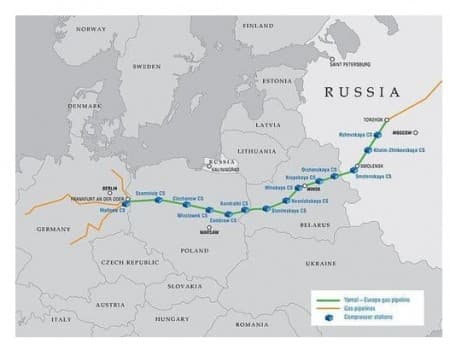One week after we first observed the staggering surge in European natural gas prices, those same prices hit a new record high as a slow at first, then much faster tightening of Russian supply looks set to cause a storage crunch on the continent.
 Russian gas flows via the Yamal-Europe pipeline that runs across Belarus and Poland to Mallnow, Germany…
Russian gas flows via the Yamal-Europe pipeline that runs across Belarus and Poland to Mallnow, Germany…

… have continued to shrink since the start of the month, leaving Europe out of time to refill inventories ahead of the winter. As the chart below shows, the amount of gas entering Germany at the Mallnow compressor station has plunged by almost half, signaling Russia is flowing less through the Yamal-Europe in what may be a Kremlin shot across the European bow, and a reminder of who literally keeps the lights on during the winter.

And even though Gazprom earlier today said that it was continuing to fulfill its obligations for deliveries via the Yamal-Europe gas pipeline, and was using all available options to fulfill its obligations, clearly the facts speak otherwise.
Related: Biden Administration Takes Aim At ‘Soaring’ Gasoline Prices
So what is going on? Well, according to Reuters sources, one week ago Gazprom suffered a fire at its processing plant in Urengoy which curbed gas exports via the Yamal-Europe pipeline; it also prompted the Russian natural gas giant to cancel gas condensate exports this month.
According to a Reuters report, the Aug. 5 fire at the gas condensate processing facility in the Yamal-Nenets region forced the firm to suspend condensate shipments to the Surgut gas condensate stabilization plant and lowered gas exports via the Yamal-Europe pipeline.
Of course, all of that could simply be a rationalization for what is a sharp decline in natural gas shipments to Europe, which has continued to push European nat gas futures higher, giving the continent a taste of just how expensive the coming winter could be if Russia actually were “forced” to limit natural gas exports.
Gazprom said earlier this week that it had restarted its Urengoy facility and resumed supplies of condensate, a type of light oil which is further processed into motor fuels, to the Surgut plant, but in smaller volumes. Gazprom typically supplies gas condensate to the domestic market but planned to export over 100,000 tonnes of condensate this month during scheduled maintenance at the Surgut plant.
“There will be no exports of condensate in August,” one of the Reuters sources said as the company declared force majeure on condensate exports in August.
Meanwhile, as shown in the chart above, gas flows via the Mallnow compressor station near the German-Polish border, via the Yamal-Europe pipeline, halved after the accident to 250-gigawatt hours per day (GWh/d) and were down further to 205 GWh/d on Aug 11, Bloomberg data shows.
And with supplies at a quarter of their normal levels, the Dutch TTF front-month wholesale gas price, a European benchmark, hit a record high of 45.78 euros per megawatt-hour on Wednesday, which traders said was partly caused by fears over supply and the reduction in Mallnow flows.
“Gazprom has now switched to withdrawals from storage in North West Europe trying at least partly to offset the drop. What is happening is very concerning for the market,” said Marina Tsygankova, gas analyst at Refinitiv.
In a statement on Wednesday, Gazprom Export, the company’s export arm, said it continued to fulfill its firm obligations on gas deliveries via the Yamal-Europe pipeline, using “available options and routes for gas deliveries.” One can only imagine what would happen to European nat gas prices if Gazprom decided – for whatever reason – to stop fulfilling its gas delivery obligations…
